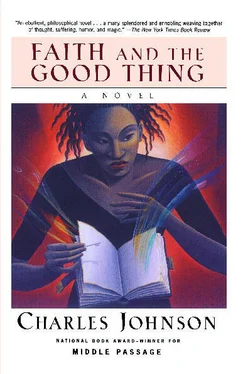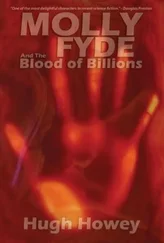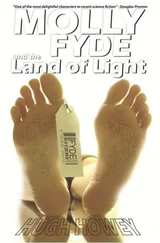“I’ve looked for you,” he cried, sucking in his breath, “looked and looked and looked—”
Faith took his wrist and lifted his right hand from the red water. No bones seemed broken. She glanced at the door, saw splintered shards of wood, and, for some reason, was relieved. Only his black thumbnail was shattered, and hung obliquely from his thumb. There was much blood, but no irremediable damage that she could see. She tore a strip from her bedsheet, wrapped it tightly around his thumb, and pointed with finality toward the door. “Now, get out.” She knew she was too tired to struggle with him, and hoped he would leave.
Red-eyes shivered, sneezed, then coughed up clear phlegm with such violence that Faith grabbed his shoulders so he would not fall. She felt his forehead. It was burning. His arms — livid. She led him to her bed where she sat him down — spiteful that he occupied the space she needed there. He tugged his ragged shirttail from his trousers. Blew his nose. Hoo- oonk! And dried his eyes.
Faith put her hands on her hips and arched her back, trying to stretch the stiffness out of her spine. “Are you all right?” she said.
“I am not such a fool as I look,” he said. He peered around her room and curled back his tawny lips. “Much like van Gogh’s wretched little room, isn’t it?” She didn’t appreciate that. It was true that the room was too much like a prison to be comfortable. She didn’t want to think about it and, instead, half closed her eyes, squeezing the sore muscles of her right arm. Red-eyes sighed. “But here we are — Comte’s Woman and Priest.” He looked at his swollen thumb curiously, as though it were affixed to a stranger’s hand, then hid it in his lap. With his free hand he reached into the large pockets of his coat, prattling, “I suppose I should say something about Universal Religion, but I’m not up to it.” He began producing from his pocket, one by one, articles which he laid on her bed.
“This is yours”—a wad of bills wound with a dirty string.
“Ugh! Not this !”—lint.
“But — yes! — this”—a cigarette lighter.
“And this”—a silver key.
He stood up, retrieved his book from the floor, and handed it to her. “And this. The little key will open it.”
Faith weighed the book in her hands. A small leather strap stretched across its dog-eared edges. It was lightweight, covered with black binding, and bore a name in cerise letters on the cover: Dr. Richard M. Barrett.
“That,” Barrett said beside her as he removed the bandage and sucked at his swollen thumb, “is all I own. You’re in need, so it’s yours. I can tell these things — it’s a nimbus around you, child. I’d give you more — ah! life itself if I could — but my Doomsday Book is the best of my possessions.”
“What?” Faith gripped the book. She fumbled at its rusty lock with her key. Barrett placed his piebald hand over it and shook his head. “Don’t open it just yet. The Tree of Knowledge is not, I’m afraid, the Tree of Life.” He smiled broadly, and blew his nose into his hand: Whee- oonk! Then wiped his hand on the front of his shirt and said, “It’s the final vintage of a life devoted to incessant inquiry, the sum total of every truth I have come to know and believe. Haven’t you always wanted to see such a book?”
“Yes,” Faith said. And though she knew her curiosity dated only from the time of Big Todd’s death, she said, “All my life.”
“Well, that’s precisely why I wrote it — supply and demand; but there’s only one copy,” Barrett said, scratching his upper lip thoughtfully, “so be careful.” His pupils struggled behind cream-colored cataracts to focus on Faith. “What is your name, child?”
“Faith.”
Barrett smiled; his cheeks were round and puffy. “Und Wunderbarist der Glaubens liebstes Kind, eh?”
“Huhn?”
“Never mind.” From a pocket inside his coat Barrett withdrew a half-finished fifth of Scotch and two very used and wrinkled paper cups. He filled both, and thrust one at Faith. As she drank, he soaked, in his Scotch, his sanguine thumb.
“Why are you doing all this for me?” Faith asked. “If you think I’m going to forgive you, you’re wrong!” Her anger and outrage were building again. “I wouldn’t be in this mess if it wasn’t for you!”
Barrett wet his cracked lips, fingered a wide fold under his chin, and said in a thin voice, “You’ll have to explain. My memory — it fades, you see. ”
For once Faith felt like confessing, like opening herself completely and unraveling her entire odyssey on the bed beside Barrett. She was almost out of stories, and it seemed that truth and beauty and the Good Thing were only there — in fabulous fictions and austral tales told in a mystery-freighted voice. Is that why people told stories? Was it because beauty and order could exist only in the fairy tale, in a painting, or sometimes in well-told lies? She remembered Big Todd telling lies so often it became unclear what was and was not true. She thought of the one about Lucille, Hatten County’s only streetwalker. Old, inured to being always for others, she had, according to Todd, been untouched by her condition. Example: one evening Lucille opened the door to her room above the town saloon and found, wrapped in a beige tablecloth, an abandoned baby girl. “Right,” Lucille said, and without another thought she took the child in, clothed and fed her, and reared her for an entire year. The child’s mother finally appeared, guilty and bereaved, and demanded her daughter. “Right,” Lucille said; and in the same tone she said “Right” when drought ruined the county’s cane and cotton crops, “Right” when the weather was good, “Right” to everything; for somehow, Todd said, Lucille knew the secret. She was the secret, and the secret, he said, had everything to do with ease — with the way water effortlessly wore away boulders, temples, and thrones. Like the way Big Todd boasted he could beat any man in Georgia, in the world, with what he called his perfect defense. Faith and everyone else thought he was lying. But when Ed Riley, the blacksmith, put Todd to the test, he made good his claim. Riley climbed to the top of the courthouse — the tallest building in town, three stories high — and told Todd to block, if he dared, the anvil he dragged to the roof with him. Big Todd stood bare-chested on the ground below, fingering his mustache. The crowd took bets that his head would be crushed as flat as a dime. Lavidia, sitting in their wagon with a blue umbrella to shield her from the sun, squawked, “Go ’head, kill y’self, ya damned fool! Go ’head, make me a widow,” and then began to cry. The odds were one hundred to one against Todd’s walking away from there alive. And only Faith had come to believe he could block that anvil. Riley, his black muscles bulging, dropped the anvil from the roof. Faith saw it hang momentarily, a black bolt in the beryline sky, then plummet like a dead bird. Todd stood still. Its shadow fell across him. The crowd cried, “Eeeeee!” and Lavidia hid her eyes.
Big Todd stepped aside.
It had everything to do with ease. Faith started. Barrett, with his forefinger, was wiping a tear from her cheek.
“Tell me,” he said.
“People fail when they start looking for the Good Thing,” she said.
Barrett nodded and clucked his tongue. “Es irrt der Mensch, solang er strebt.”
Faith paid him no mind. Once started, it bubbled from her, became a deluge. “There isn’t any Good Thing! There never was! It’s all an evil lie to keep us happy! There’s nothing!” She shook her head and felt very old. “Nothing!”
Barrett, before she could finish, was on his feet, his hands behind his back and pacing to and fro with heavy footfalls from wall to wall. His progress reminded her of the way he-bears move, swaying with their arms swinging at their sides, their feet shuffling. Uncertainly, to and fro. By the open door he stopped, looked out to see if they were being overheard, then whispered, “‘Herein you have, my daughter, raised the grand problem of man’s existence, which is’—Comte to the contrary — whether everything that is actual must, like the sound of the tree that falls in an uninhabited forest, be perceived or thought to be!”
Читать дальше












